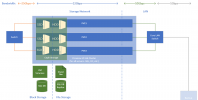Hi all!
I'm looking at potential hypervisors for my company's network - we run a small Windows AD (2 DC's) with some Windows file shares and a SQL server with a couple of small databases on it. The hardware will be reaching end of life soon so I thought it's a good opportunity to explore the hyper-converged Ceph clustering available through Proxmox (something like the attached simplified diagram - granted the switches could be single points of failure so I'd put some redundancy in there too).
I guess for me, reliability and availability are more important than performance.
Does anyone else run a MS SQL server on a Proxmox Ceph cluster and if so, how significant is the decrease in performance compared to local storage? How have you arranged storage in Proxmox?
I'm guessing that a HA failover event where the SQL server migrates to another node in the cluster would leave the database in a crashed state so I'd be interested to hear from others if there is any way to mitigate this.
Many thanks
I'm looking at potential hypervisors for my company's network - we run a small Windows AD (2 DC's) with some Windows file shares and a SQL server with a couple of small databases on it. The hardware will be reaching end of life soon so I thought it's a good opportunity to explore the hyper-converged Ceph clustering available through Proxmox (something like the attached simplified diagram - granted the switches could be single points of failure so I'd put some redundancy in there too).
I guess for me, reliability and availability are more important than performance.
Does anyone else run a MS SQL server on a Proxmox Ceph cluster and if so, how significant is the decrease in performance compared to local storage? How have you arranged storage in Proxmox?
I'm guessing that a HA failover event where the SQL server migrates to another node in the cluster would leave the database in a crashed state so I'd be interested to hear from others if there is any way to mitigate this.
Many thanks


